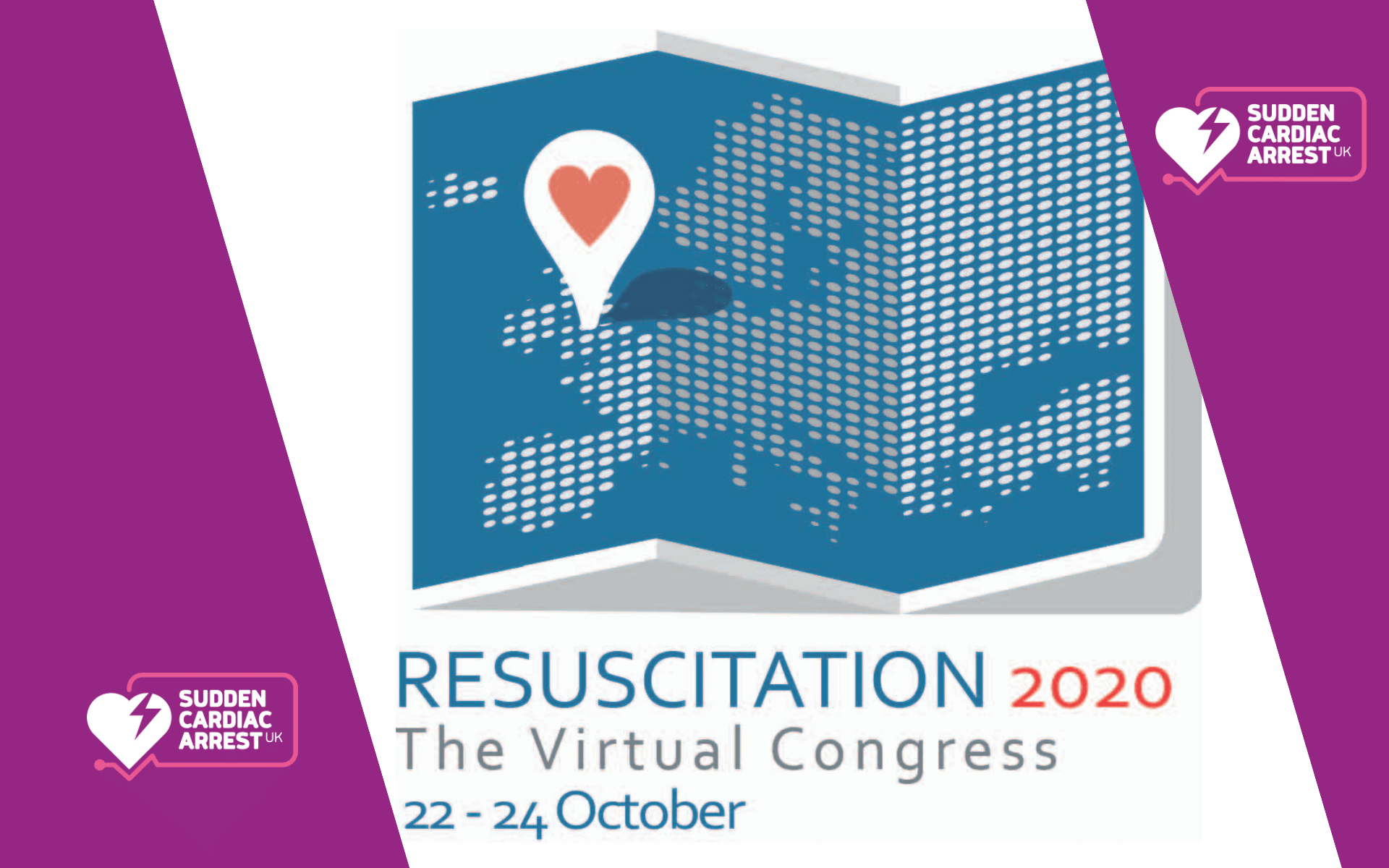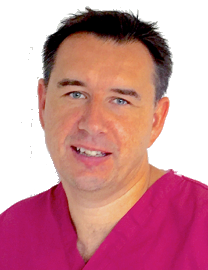We are proud to be presenting at the European Resuscitation Council #RESUS2020 Virtual Conference.
As part of this international event, there will be 3 sessions dedicated to survivorship on Saturday 24th October.
These sessions are FREE to attend for survivors and their families – no matter where you live. All you need to do is register…
Each session will be streamed live and will feature a summary of the listed presentations (see below) and then a moderated discussion with the speakers and expert panel members. Those joining to watch live can ask questions during the sessions.
All the presentations will be pre-recorded (~10 mins each) and available to watch before or after the scheduled times. To make the most of the live sessions you are strongly encouraged to watch the presentation videos before the session start time.
Programme
The survivor’s sessions will take place on Saturday 24th and the programme is as follows (but is subject to change). All times given are for the UK (BST) and speakers are from the UK unless otherwise stated.
Session 1 – The Survivorship Story
08:30 – 09:30
Chaired by Dr Kelly Sawyer (US)
Moderated by Dr Katie Dainty (CAN), Sue Hampshire & Professor William Toff
A moderated discussion:
- What’s it like to be a survivor – Paul Swindell
- What’s it like to be a rescuer – Stuart Menzies
- New normality (data drive outcomes/experiences) – Dr Kirstie Haywood
- What patient’s want and how can we make survivorship better – Dr Thomas Keeble
You must register to be able to take part in the congress but for survivors and family members, it is FREE.
A great selection of speakers and moderators has been assembled for the survivorship day of the European Resuscitation Council #Resus2020 event and you can find out more about them below.
Dr Kelly Sawyer (US), Assistant Professor, SCA survivor
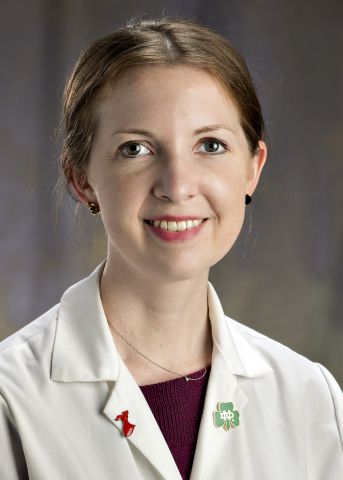
Dr Sawyer is possibly unique in that she is a trained medical doctor and also a cardiac arrest survivor. This means she has great insight into both sides of a patients journey and earlier this year was the lead author on the scientific statement from AHA on Sudden Cardiac Arrest survivorship. She completed her residency in Emergency Medicine at Allegheny General Hospital in 2009 and went on to a fellowship in Emergency Cardiac Care and Resuscitation at Virginia Commonwealth University. In 2011 she finished her fellowship, along with a Masters of Science in Clinical Research and Biostatistics. She subsequently spent 5 years at Beaumont Health in Royal Oak, MI, where she mentored young investigators through scholarly work and coordinated a multidisciplinary post-cardiac arrest team to enhance collaborative and consistent care in-hospital and after discharge. Currently, she is faculty at the University of Pittsburgh School of Medicine, with a primary scholarly focus on long term outcome and survivorship after cardiac arrest.
Dr Katie Dainty (CAN), Bystander Support Network

Dr Dainty is a qualitative and mixed methods scientist and is the Research Chair in Patient-Centred Outcomes at North York General Hospital, Toronto. She is also a passionate advocate for bystanders in a cardiac arrest scenario – “the forgotten patient“. She is currently undertaking research into understanding survivorship following Sudden Cardiac Arrest from both the patient and family perspectives and is also a co-founder of the Canadian organisation Bystander Support Network which aims to support people who have witnessed someone having a cardiac arrest, who have performed CPR or who have survived a cardiac arrest.
Sue Hampshire, Resuscitation Council UK
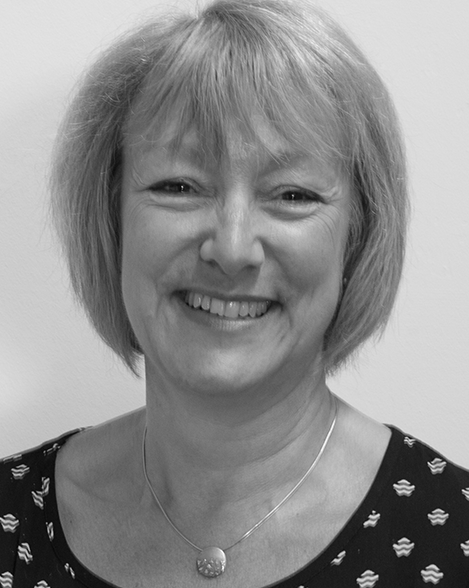
Sue Hampshire is the Director of Clinical and Service Development and has as worked for the Resuscitation Council UK since 2012. Her role includes the management of Resuscitation Council UK’s courses and involvement in related projects. Since taking up her post she has worked on the development and improvement of new and existing courses. Sue is involved in the organisation of Resuscitation Council UK events and has organised resuscitation training sessions at the British Cardiac Society and Royal College of Paediatrics and Child Health conferences. Before joining RCUK, Sue worked as a Senior Resuscitation Officer at the Oxford University Hospitals NHS Trust.
Professor William Toff, Cardiologist
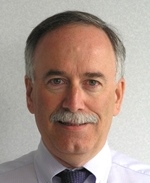
Professor Toff is a lecturer in Cardiology at the University of Leicester with an honorary clinical appointment at the University Hospitals of Leicester NHS Trust. His main clinical and research interests are in the field of cardiac arrhythmia and implanted cardiac rhythm management devices. He has extensive experience in health technology assessment and cardiovascular clinical trials, and he served as the founding Director of the Leicester Clinical Trials Unit. He is also the founder of the Heartwize charity that provides AED’s and CPR training throughout schools in Leicestershire and Essex.
Paul Swindell, SCA survivor
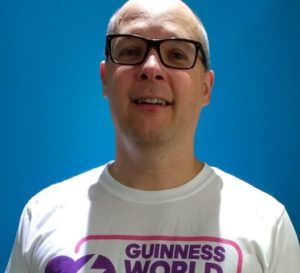
Before his cardiac arrest in 2014, Paul worked as a freelance IT consultant. After arranging a meet-up of SCA survivors and lifesavers he set up the peer support group Sudden Cardiac Arrest UK. He spends time supporting the group and creating resources to help other survivors and lifesavers including this website, publishing the group’s leaflet, 2 volumes of “Life After Cardiac Arrest” book and has hosted 50 episodes of the podcast “Life After Cardiac Arrest“. He also assists Dr Keeble’s CARE study presentations by giving a patients perspective on life after cardiac arrest.
Stuart Menzies, Lifesaver

Stuart is a senior police officer in the Scottish Police Force and is also a lifesaver. In 2016 he performed CPR on his wife when she experienced an SCA in a local supermarket. Despite having previous experience of performing CPR, doing it on a loved one turned out to be a quite different experience. Stuart is an active member of SCA UK and helps other lifesavers and family members going through the post-event rollercoaster. He has contributed to the SCA UK blog and the second volume of the “Life After Cardiac Arrest” book. He has also been a guest on the “Life After Cardiac Arrest” podcast.
Dr Kirstie Haywood, Associate Professor

Dr Haywood is a researcher at the Warwick Medical School specialising in the challenges of patient-reported outcomes (PROMS). She has recently started work on a study to cover Cardiac Arrest Survivors. Well-developed patient-reported outcome measures provide valid and reliable assessments of health and treatment outcome, informing the assessment of disease burden, healthcare evaluation, and decision-making for health professionals, managers and patients, and hence contributing significantly to health research and service provision. In early 2020 she published a study “Trapped in a disrupted normality: Survivors’ and partners’ experiences of life after a sudden cardiac arrest” which looked to improve understanding of the consequences of surviving a cardiac arrest.
Dr Tom Keeble, Consultant Cardiologist
Dr Keeble is an interventional cardiologist with a specialist research interest in cardiac arrest and has conducted and published a number of studies in this field including targeted temperature management and neuro-prognostication. In 2013 he set up the UK’s first Care After REsuscitation (CARE) clinic in the Essex Cardiothoracic Centre in association with Anglia Ruskin University. He now understands a huge unmet need within the follow-up and service provision for survivors of cardiac arrest and their families. He has recently co-founded the International Taskforce for Cardiac Arrest Recovery (ITCAR) to try and improve evidence and guidance for patients and deliver a better follow up and rehabilitation service for these vulnerable patients; for which cardiac rehab teams will be at the heart. He has also created the “Life After Cardiac Arrest” video and is a regular guest on the similarly named, “Life After Cardiac Arrest” podcast.
Session 2 – Survivorship Challenges
12:00 – 12:55
Physical and mental challenges, assessments and treatments for survivors and their families
Chaired by Professor Hans Friberg (SWE)
Moderated by Dr Marco Mion, Gisella Lilja (SWE) & Dr Thomas Keeble
A moderated discussion:
- Fatigue – Donna Malley
- Memory – Professor Barbara Wilson
- Cognitive and psychological assessment and treatments – Dr Rosalind Case (NZ/AUS)
- Return to work – Professor Karen Smith (AUS)
Professor Hand Friberg (SWE), Intensive Care

Hans Friberg, MD, Ph.D., EDIC is a Professor of Anesthesiology and Intensive Care Medicine at Lund University, Sweden, and a senior consultant at Skåne University Hospital, Malmö, Sweden. Dr Friberg did his PhD-work at the Laboratory for Experimental Brain Research at Lund University, where he studied brain injury and mitochondrial dysfunction in rodent models of global and focal brain ischemia.
Dr Friberg’s present research area is post-resuscitation care and temperature management after cardiac arrest. He has published some 200 scientific papers. He is the senior author of the Targeted Temperature Management after cardiac arrest trial (TTM-trial) and also a senior author of the ongoing TTM2-trial. Dr Friberg is an initiator of the Hypothermia Network which has become the International Cardiac Arrest Registry (INTCAR), a transatlantic research collaboration with more than 6000 registered patients. He is the initiator of SWECRIT, a large regional biobank for critically ill patients in the ICU. Dr Friberg is a co-author of the ERC guidelines on post-resuscitation care and serves on the Board of the Swedish Resuscitation Council.
Dr Marco Mion (UK/ITA), Clinical Psychologist
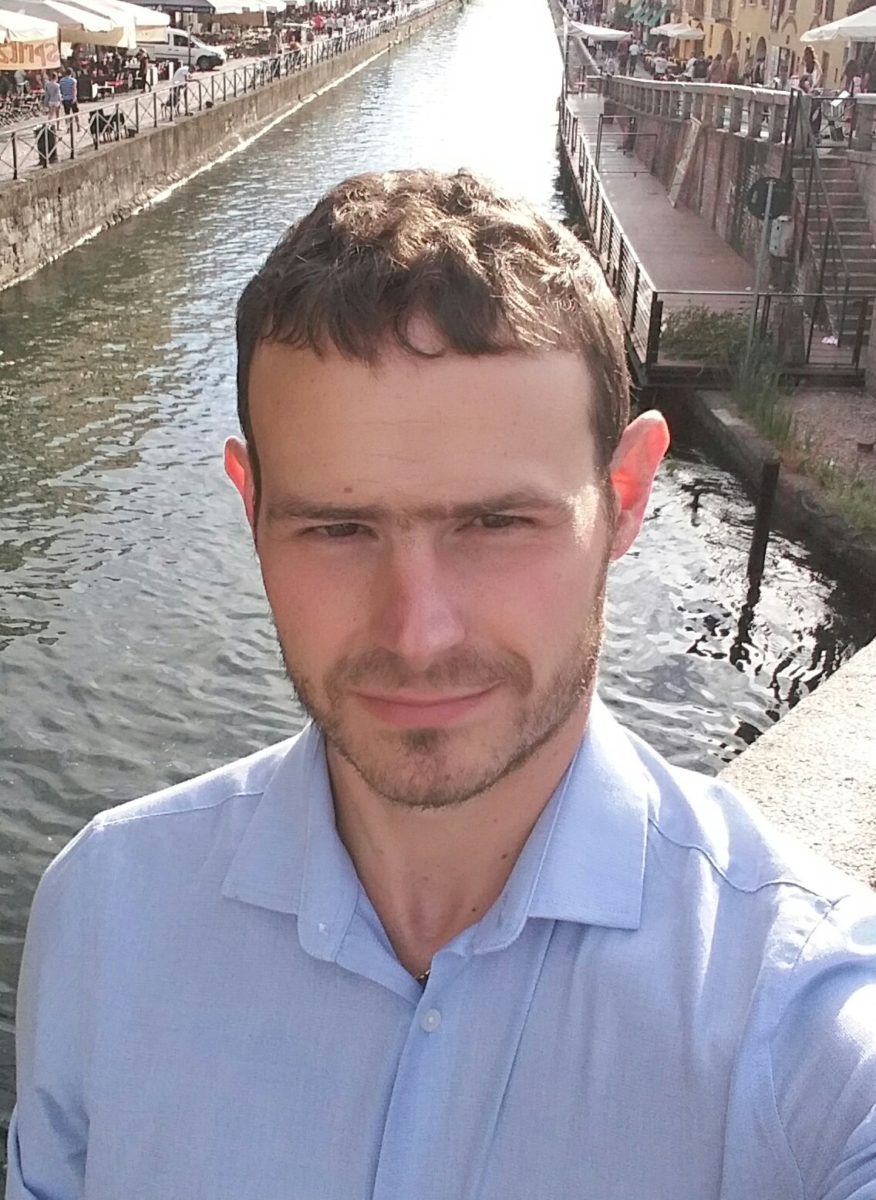
Dr Mion works at the Essex Cardio-Thoracic Centre clinic for out of hospital cardiac arrest survivors and their families, and additionally as a stroke and community neuropsychologist in central London. I have been involved with CARE (Care After Resuscitation) since 2016. He received his MSc in General and Experimental Psychology at the University of Milano-Bicocca (Italy) in 2005. He then completed a PhD in Neuroscience at the University of Modena (Italy) in 2010, spending a year in the Department of Clinical Neuroscience at Addenbrooke’s Hospital (Cambridge, UK) as a Visiting PhD student. He has been working for the NHS since 2011 in different settings: memory services, hyperacute and acute stroke units and inpatient/community neuro-rehabilitation teams.
Gisella Lilja (SWE), Occupaptional Therapist

Gisella is an occupational therapist clinically working at the division of neurology and rehabilitation medicine in Lund at an out-patient Stroke rehabilitation facility. My main research focus is the long-term outcome and cognitive impairment after out-of-hospital cardiac arrest. In the large TTM-trial, we collected extensive information about survivor’s health-related quality of life, functional outcome, cognitive performance, psychological well-being and ability to participate in daily life. We also assessed relative’s health-related quality of life and feelings of burden. The aim is to describe both long-term outcomes of cardiac arrest survivors in general, but also to identify a clinically helpful screening model to easily detect survivors in risk for a less successful recovery, and in need of extra support and rehabilitation.
Dr Tom Keeble, Consultant Cardiologist
Dr Keeble is an interventional cardiologist with a specialist research interest in cardiac arrest and has conducted and published a number of studies in this field including targeted temperature management and neuro-prognostication. In 2013 he set up the UK’s first Care After REsuscitation (CARE) clinic in the Essex Cardiothoracic Centre in association with Anglia Ruskin University. He now understands a huge unmet need within the follow-up and service provision for survivors of cardiac arrest and their families. He has recently co-founded the International Taskforce for Cardiac Arrest Recovery (ITCAR) to try and improve evidence and guidance for patients and deliver a better follow up and rehabilitation service for these vulnerable patients; for which cardiac rehab teams will be at the heart. He has also created the “Life After Cardiac Arrest” video and is a regular guest on the similarly named, “Life After Cardiac Arrest” podcast.
Donna Malley, Occupaptional Therapist
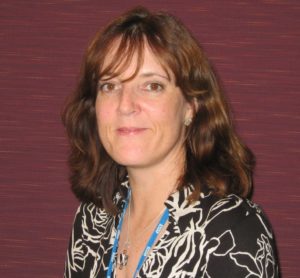
Donna has over 25 years’ experience working in the NHS with people following an acquired brain injury. She is currently Chair of the Royal College of Occupational Therapists Specialist Section Neurological Practice. She joined the Oliver Zangwill Centre for Neuropsychological Rehabilitation in 1998 where she developed her interest in fatigue, completing an MSt and co-producing the Headway booklet Managing Fatigue after Brain Injury. She has also contributed to The Brain Injury Rehabilitation Workbook (2016) and Neuropsychological Rehabilitation; The International Handbook (2017) and co-written a paper Fatigue after Brain Injury: a model to guide clinical management (2014; ACNR). Fatigue is clinically important and commonly misunderstood. This presentation will provide an overview of the current evidence base regarding factors contributing to persistent fatigue. A clinical model will be used to support understanding and management. The need for understanding an individual’s experience, the involvement of family and others, peer support and self-management techniques will be discussed.
Professor Barbara Wilson, Clinical Neuropsychologist
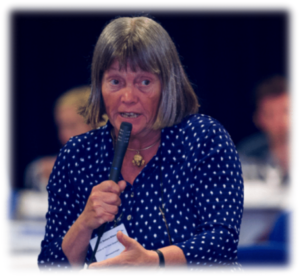
Barbara has worked in brain injury rehabilitation for over 40 years. She has published 27 books, over 300 articles and chapters and 8 neuropsychological tests. She has won many awards for her work including an OBE from the Queen in 1998, for services to rehabilitation; five-lifetime achievement awards, honorary degrees from The Universities of East Anglia and Cordoba, Argentina. She is the editor of the journal “Neuropsychological Rehabilitation” which she founded in 1991. In 1996 she established the Oliver Zangwill Centre for Neuropsychological Rehabilitation. The UK Division of Neuropsychology has named a prize after her, the ‘Barbara Wilson prize for distinguished contributions to neuropsychology’. She is a Fellow of The British Psychological Society, The Academy of Medical Sciences and The Academy of Social Sciences. She is an honorary professor at the University of Hong Kong, Sydney and East Anglia.
Dr Rosalind Case (NZ/AUS), Clinical Psychologist
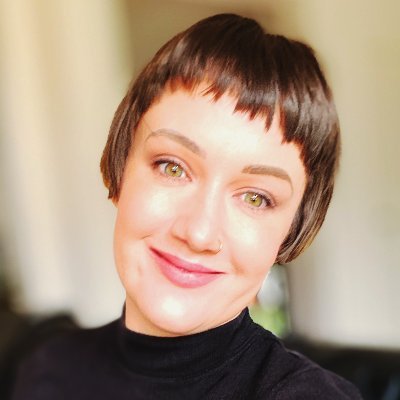
Dr Rosalind Case is a clinical psychologist and Adjunct Research Fellow in the Department of Epidemiology and Preventive Medicine. She leads a programme of research investigating the neurocognitive and psychosocial outcomes of cardiac arrest survivors and their families, with a focus on translational outcomes in the development of post-arrest clinical services. She is a founding member of the International Taskforce for Cardiac Arrest Recovery (ITCAR).
Professor Karen Smith (AUS), Ambulance Victoria
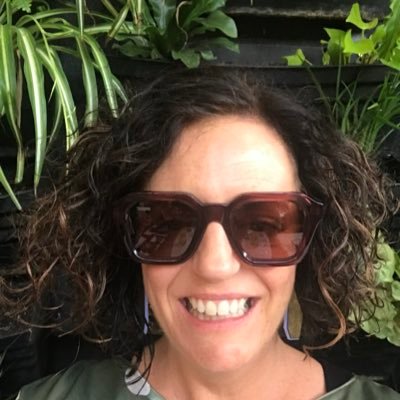
Professor Smith is the Director of Research and Evaluation at Ambulance Victoria, Australia. She is an epidemiologist with extensive experience in pre-hospital research and clinical trials. Karen completed a PhD in 2003 at the Department of Epidemiology and Preventive Medicine, Monash University. She was the recipient of an NHMRC PhD scholarship and an NHMRC Post-Doctoral Fellowship. Karen has retained an Honorary Senior Lecturer position at the Department of Epidemiology and Preventive Medicine. She is also an Adjunct Associate Professor – Emergency Medicine Discipline at the University of Western Australia. In addition, she is a member of the Falck Foundation Medical Advisory Committee, which supports and promotes pre-hospital research.
Karen co-founded and chairs the Victorian Cardiac Arrest Registry (VACAR) which contains information for all patients in Victoria, who suffer cardiac arrest and receive ambulance attendance. This registry is regarded internationally as a key OHCA quality assurance activity and fosters a large research program and international collaboration. Karen also co-founded the Victorian State Trauma Registry (VSTR) at Monash University and remains on the Steering Committee. In 2012 she won the Ambulance Victoria Inaugural CEO Award for Leadership Excellence.
Session 3 – Global Survivorship Support
13:00 – 14:00
How to support survivors and families around the world
Chaired by Professor Karen Smith (AUS)
Moderated by Dr Benjamin Abella (US), Paul Swindell (UK) & Dr Kelly Sawyer (US)
A moderated discussion:
- The New York model (4C) / Impact of COVID – Dr Sachin Agarwal (US)
- Denmark – Dr Vicky Joshi (UK/DEN)
- Lund/ TTM2 – Gisella Lilja (SWE)
Professor Karen Smith (AUS), Ambulance Victoria

Professor Smith is the Director of Research and Evaluation at Ambulance Victoria, Australia. She is an epidemiologist with extensive experience in pre-hospital research and clinical trials. Karen completed a PhD in 2003 at the Department of Epidemiology and Preventive Medicine, Monash University. She was the recipient of an NHMRC PhD scholarship and an NHMRC Post-Doctoral Fellowship. Karen has retained an Honorary Senior Lecturer position at the Department of Epidemiology and Preventive Medicine. She is also an Adjunct Associate Professor – Emergency Medicine Discipline at the University of Western Australia. In addition, she is a member of the Falck Foundation Medical Advisory Committee, which supports and promotes pre-hospital research.
Karen co-founded and chairs the Victorian Cardiac Arrest Registry (VACAR) which contains information for all patients in Victoria, who suffer cardiac arrest and receive ambulance attendance. This registry is regarded internationally as a key OHCA quality assurance activity and fosters a large research program and international collaboration. Karen also co-founded the Victorian State Trauma Registry (VSTR) at Monash University and remains on the Steering Committee. In 2012 she won the Ambulance Victoria Inaugural CEO Award for Leadership Excellence.
Dr Benjamin Abella (US), Director, Center for Resuscitation Science

Dr Abella is a Director at the Center for Resuscitation Science and a Professor of Emergency Medicine at the University of Pennsylvania. He studies sudden cardiac arrest, specifically, projects within his clinical research team include the evaluation of CPR and resuscitation performance, testing new methods to teach CPR in the community, prognostication of neurologic outcomes after cardiac arrest, and methods to improve the application of therapeutic hypothermia. Dr Abella is also the developer and Medical Director of a novel training course for post-arrest care and targeted temperature management (TTM), the Penn TTM Academy.
Dr Abella has published over 200 scholarly works, reviews and monographs in numerous professional journals including NEJM, JAMA and Circulation, as well as textbook chapters on cardiac arrest and resuscitation. He is Co-Chair of the global Resuscitation Science Symposium and has participated in developing international CPR guidelines. He has won a number of honours for his research, clinical care in the Emergency Department and his teaching of residents and medical students, and has lectured widely on the topics of cardiac arrest and post-arrest treatment. The investigative work of Dr Abella’s team is supported by funding from the NIH and PCORI, as well as industry sources.
Paul Swindell, SCA Survivor

Before his cardiac arrest in 2014, Paul worked as a freelance IT consultant. After arranging a meet-up of SCA survivors and lifesavers he set up the peer support group Sudden Cardiac Arrest UK. He spends time supporting the group and creating resources to help other survivors and lifesavers including this website, publishing the group’s leaflet, 2 volumes of “Life After Cardiac Arrest” book and has hosted 50 episodes of the podcast “Life After Cardiac Arrest“. He also assists Dr Keeble’s CARE study presentations by giving a patients perspective on life after cardiac arrest.
Dr Kelly Sawyer, Assistant Professor, SCA Survivor

Dr Sawyer is possibly unique in that she is a trained medical doctor and also a cardiac arrest survivor. This means she has great insight into both sides of a patients journey and earlier this year was the lead author on the scientific statement from AHA on Sudden Cardiac Arrest survivorship. She completed her residency in Emergency Medicine at Allegheny General Hospital in 2009 and went on to a fellowship in Emergency Cardiac Care and Resuscitation at Virginia Commonwealth University. In 2011 she finished her fellowship, along with a Masters of Science in Clinical Research and Biostatistics. She subsequently spent 5 years at Beaumont Health in Royal Oak, MI, where she mentored young investigators through scholarly work and coordinated a multidisciplinary post-cardiac arrest team to enhance collaborative and consistent care in-hospital and after discharge. Currently, she is faculty at the University of Pittsburgh School of Medicine, with a primary scholarly focus on long term outcome and survivorship after cardiac arrest.
Dr Sachin Agarwal (US), Assistant Professor of Neurology

Dr Agarwal is an assistant professor of neurology and neurocritical care at Columbia University Irving Medical Center and founder of the nation’s first NeuroCardiac Comprehensive Care Clinic dedicated to cardiac arrest patients with neurologic injury. He co-directs the Neuro-Research Consortium and the International Cardiac Arrest Registry (INTCAR) and is the principal investigator of a longitudinal cohort study to identify novel targets for reducing cognitive, psychological, and secondary cardiovascular risk in survivors of cardiac arrest. He serves on the American Heart Association’s Council on Cardiopulmonary, Critical Care, and Resuscitation and the Society of Critical Care Medicine’s THRIVE initiative, a national and an international collaborative effort for peer-to-peer support for ICU patients. In addition to participating in the AAN Emerging Leaders’ Forum, he is a faculty advisor for the AAN Student Interest Group in Neurology and serves on the AAN’s Undergraduate Education Subcommittee.
Dr Vicky Joshi (UK/DEN), Physiotherapist

Vicky comes from England and has a Masters degree in physiotherapy and works in Denmark at the Knowledge Center for Rehabilitation and Palliation. She is affiliated with the Rehabilitaion Group and worked on the “Exploring life after cardiac arrest” project. She is also involved with the Danish Cardiac Arrest registry and is secretary of the DANCAS network (Danish Cardiac Arrest of Survivorship network).
Gisella Lilja (SWE), Occupaptional Therapist

Gisella is an occupational therapist clinically working at the division of neurology and rehabilitation medicine in Lund at an out-patient Stroke rehabilitation facility. My main research focus is the long-term outcome and cognitive impairment after out-of-hospital cardiac arrest. In the large TTM-trial, we collected extensive information about survivor’s health-related quality of life, functional outcome, cognitive performance, psychological well-being and ability to participate in daily life. We also assessed relative’s health-related quality of life and feelings of burden. The aim is to describe both long-term outcomes of cardiac arrest survivors in general, but also to identify a clinically helpful screening model to easily detect survivors in risk for a less successful recovery, and in need of extra support and rehabilitation.
You can see the full 3-day congress programme here, but remember many of these are for resuscitation professionals and may not be suitable for survivors or other laypersons.

